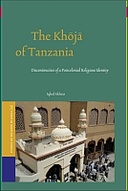Explore

The Khōjā of Tanzania: Discontinuities of a Postcolonial Religious Identity attempts to reconstruct the development of Khōjā religious identity from their arrival to the Swahili coast in the late 18th century until the turn of the 21st century. This multidisciplinary study incorporates Gujarati, Kacchī, Swahili, and Arabic sources to examine the formation of an Afro-Asian Islamic identity (jamatī) from their initial Indic caste identity (jñāti) towards an emergent Near Eastern imaged Islamic nation (ummatī) through four disciplinary approaches: historiography, politics, linguistics, and ethnology. Over the past two centuries, rapid transitions and discontinuities have produced the profound tensions which have resulted from the willful amnesia of their pre-Islamic Indic civilizational past for an ideological and politicized ‘Islamic’ present. This study aims to document, theorize, and engage this theological transformation of modern Khōjā religious identities as expressed through dimensions of power, language, space, and the body.
This book is included in DOAB.
Why read this book? Have your say.
You must be logged in to comment.
Rights Information
Are you the author or publisher of this work? If so, you can claim it as yours by registering as an Unglue.it rights holder.Downloads
This work has been downloaded 35 times via unglue.it ebook links.
- 35 - pdf (CC BY-NC-ND) at OAPEN Library.
Keywords
- Afro-Asian Islamic
- discontinuities
- Identity
- Khōjā
- postcolonial
- religious citizenship
- Religious identity
- Tanzania
Links
DOI: 10.1163/9789004292888Editions

